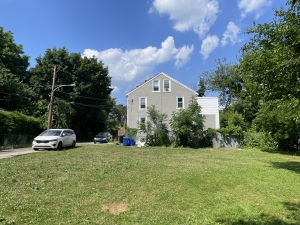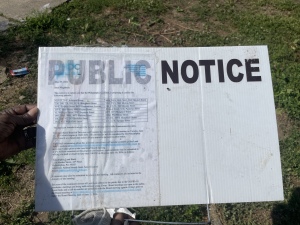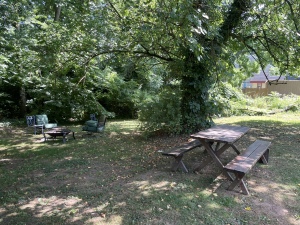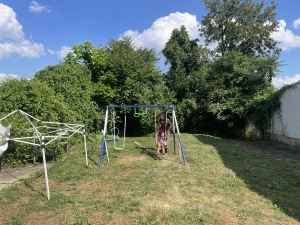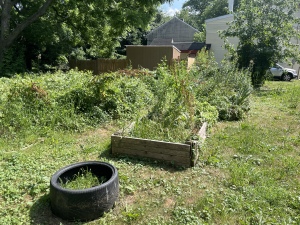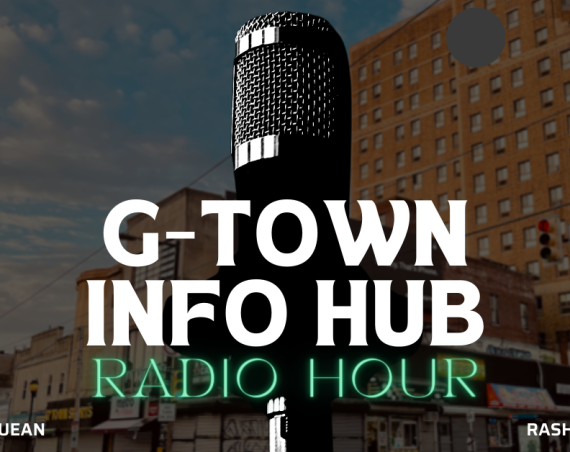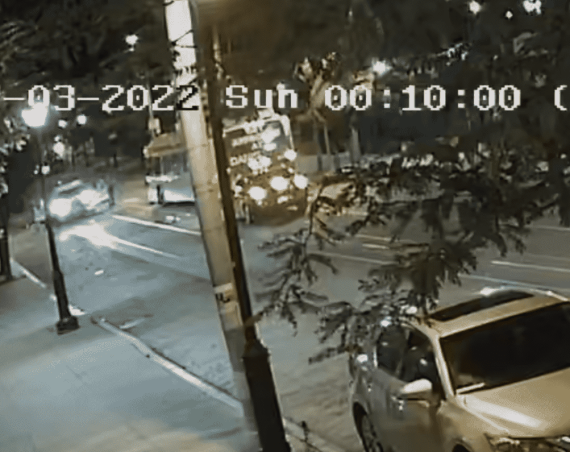Jennifer Hombach was taken by surprise when she walked out of her house on the 300 block of Mechanic Street to find black and white “Public Notice” yard signs placed in the green space down the street.
The notices informed her and neighbors that, in less than a week, the Philadelphia Land Bank (PLB) would be voting on whether or not to convey 70 undeveloped properties to a housing developer, including two areas in her immediate vicinity.
While technically owned by the City of Philadelphia, the land on Mechanic Street, a quiet residential street in East Germantown, has been a de facto meeting space for community members over the past several decades. Residents have set up a small garden next to picnic tables underneath shady trees, and they aren’t inclined to give it away.
When she learned what was happening, Hombach sprung into action: she started a petition on Change.org that now has 184 signatures and spoke to many of her neighbors. That includes Madylin Harris, who has lived on the block for over 50 years. She told Hombach in an interview she recorded that underneath the vacant land is actually a body of water, which she fears could lead to flooding for neighbors on the block down the hill if the land is developed.
“When I moved here between 1970 and 71… the lot had fruit and vegetables growing there,” Harris told Hombach. She learned from neighbors at the time that there had been houses on the land previously, “but they had to move because there was flooding.” Historically, there was a creek underneath the land, she learned.
“My neighbors have been tending the land; they have garden beds,” Jen said. “It was heaven to have this space.”
Trina, who has lived on the block for eight years, cherishes the vacant lot next to her house, which her grandchildren play in. It has a swing set that she and her daughter installed and a trampoline.
“Why does everything have to be a concrete jungle?” she asked. “Why can’t we have greenery, some grass?”
Hombach’s efforts ultimately led the land bank’s commissioners to leave the land on her block as it is—at least for now.
The properties set to be transferred are part of an unsolicited proposal by Civetta Property Group to the Philadelphia Land Bank. Civetta plans to develop them into two-story, three-bedroom houses to be sold to Philadelphians with a household income of 80% or less than the area median income ($82,600 for a household of 3) at a maximum sales price of $250,000.
Angel Rodriguez, senior vice president of land management at PLB, explained at the land bank’s June 11 board meeting that while that price sounds high, the city’s Turn The Key program for first-time homebuyers makes it significantly more affordable.
“What I can tell you is that … the average homebuyer that’s coming through the Turn The Key program is making on average $45,000 a year,” Rodriguez said. “The mortgage payment, including taxes and interest, is around $1353 a month.”
At their meeting, the Land Bank board members voted to set aside the plots on Mechanic Street for further discussion while transferring the remaining properties. Several commissioners raised concerns, however, that neither they nor the public were given sufficient notice to assess Civetta’s proposal thoroughly.
“Frankly, it makes me incredibly uncomfortable,” said board member Kelvin Jeremiah, also president of the Philadelphia Housing Authority.
“I got a package asking me to make decisions late last night,” he said at the meeting. “I had a ton of questions; I see that my colleagues have a ton of questions… I think from my comfort level, what I would need is getting information well ahead of time so I can do my own due diligence.”
Another member, Maria Gonzalez added that to earn the public’s trust, the board should “evaluate how unsolicited applications are reviewed, so there is less confusion at the board meetings and more clarity for the public.”
While the “public notice” signs inspected by the Germantown Info Hub are dated May 29, according to Hombach and Trina, they did not appear in the neighborhood until more than a week later, on June 6, leaving the neighbors scrambling to understand the proposal and collectively respond to it.
“I think it was very inconsiderate, and I think they didn’t even give us enough time to say no,” Trina said. The quick turnaround “wasn’t enough time for us to come together as a unit, as a community. … Communication is key.”
Hombach doesn’t just want to leave the land as it is. She explained at the board meeting: “Yes, I want affordable housing, yes, I want sustainable development, but I do not want to hurt people in that process by building in places that are going to get flooded or cause mold. So I’m really hoping that that can be addressed, and there’s hope for that to be a community garden for years to come.”
Board members acknowledged in their conversations that properties throughout Philadelphia, like Mechanic Street, act as community spaces tended to by neighbors while not officially incorporated. When asked if this was taken into account by the Land Bank, Senior Vice President Rodriguez said that, while sites are inspected, it is not currently noted if people are “occupying the property without permission.”
At the same time, board chair Herbert Wetzel acknowledged, “the power of the public ownership of these properties is the power to shape their reuse, and it should be a thoughtful process, not a reactive one.”
And while Hombach, Trina, and their neighbors may want to convert the vacant land on their block into a community garden, the path forward to doing so is unclear.
Board member Jennifer Greenberg, who is also executive director of the Neighborhood Gardens Trust, pointed out that, due to the lack of available applications for an urban garden agreement with the city, “there are many people gardening on land who have tried to get legal access and have not found a pathway to do so.”
The easiest way to start a garden is to register with the state as a nonprofit, Rodriguez explained. “You’re more than welcome to acquire the property through that process or go through the side yard process. Having people access the property while it’s still titled to us is a huge liability and concern.”
It is unclear what will happen next to the plots of land on Mechanic Street. At the board meeting, Civetta Property Group co-founder Brennan Tomasetti said, “We absolutely do consider the fabric of the neighborhood” when constructing new homes. The development would take place in “three phases,” she added.
The Germantown Info Hub has contacted the Civetta Property Group and Philadelphia Land Bank for further clarification on how they conduct public outreach. We will update this article if we receive a response.

